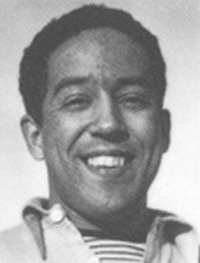 |
| (http://mrclark.aretesys.com/LangstonHughes3.jpg ()) |
"Hold fast to dreams, for if dreams die, life is a broken-winged bird that cannot fly" (Langston Hughes). These eternal words by Langston Hughes perhaps reflect best what Hughes did in his own lifetime: offering messages of hope for disheartened people. Born February 1, 1902, in Joplin, Missouri, as James Mercer Langston Hughes, Hughes spent most of his childhood in Lawrence, Kansas, raised by his loving grandmother. After unexpectedly becoming the class poet in grammar school, Hughes developed a love and passion for writing. With it, he became one of America's most inspirational writers in history. Considered one of the foremost members of the Harlem Renaissance, a movement during the 1920's when African-American literature flourished, Hughes composed countless works, ranging from newspaper columns to articles and poems. He published his first poem, "The Negro Speaks of Rivers," to wide acclaim after it appeared in the Crisis, a popular African-American newspaper. His most inspiring works, "Mother to Son," "A Dream Deferred," and "I, Too," are just a few examples of the advices and messages of hope he provided for the average, lower working class families. Through his popular fictional character, Jesse B. Semple, known as "Simple," Hughes voiced the concerns, challenges, and perceptions of an everyday African-American. Because of his honest style of writing, Hughes took fire from critics; they did not appreciate his realistic portrayals of African-American life. He braved through many attacks, and continued writing. From a young age, Hughes had already decided to live his life as an author. Determined to write, Hughes stuck to his passion even through poverty. These actions define him as a hero. A hero epitomizes the noble qualities other people want to emulate. A hero is simply anybody who applies their own time, skill, and talent to help others, whether it is saving a life or uplifting the hopes of discouraged people. Langston Hughes' ability to spread hope in an uninviting world, to exude courage despite the abuse critics showered on him, and to emanate determination though his situation remained despairing, marks him as a hero for our generation, and for centuries to come.
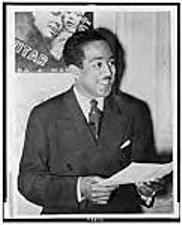 |
| (http://www.yale.edu/glc/tangledroots/hughes.jpg ()) |
Hughes' gift of utilizing literature to foster hope in the average African-American working-class family stands as one of his noblest heroic traits. According to Maurice Wallace, Associate Professor of English and African-American Studies, Hughes wrote powerfully and confidently for the Crisis: "'We younger Negro artists who create now intend to express our individual dark-skinned selves without fear or shame. If white people are pleased we are glad. If they are not, it doesn't matter. We know we are beautiful'" (68). Hughes spread hope for African-Americans by writing works, like this one, that inspired confidence and pride. Proclaiming African-Americans as 'beautiful' infused them with feelings of self-worth, giving them hope for further racial equality. Hughes' belief that African-Americans were beautiful and good reflected in his writing. It let other African-Americans know at least one person believed in them. This is how he inspired hope; he himself was hopeful. By writing with race pride in a time when people with darker skin colors were still considered inferior, Hughes inspired African-Americans with the hope their racial challenges would eventually be overcome. Instead of writing with pessimism and bitterness in the struggle for civil rights, Hughes sought to document the plight of typical African-American life: "Hughes's gentle humor and wry irony often belie the magnitude of his themes...Speaking of Hughes's wide range of works, Theodore R. Hudson stated: 'Dipping his pen in ink, not acid, [Hughes's] method was to expose rather than excoriate, to reveal rather than revile'"(Discovering Authors). By gently exposing the modern day problems in his society, rather than promoting negativity and bad feelings, Langston Hughes allowed hope for a better future to foster in his writing. He nurtured hopes in the souls of African-Americans for new lives by directing attention to racial inequality in America. Readers of Hughes' works, like Hudson, understood that Hughes' writing optimistically revealed problems in the hopes that the problems would then be changed. He inspired hope through voicing and revealing the challenges of African-Americans. Other African-Americans felt hopeful their prospects would improve now that their own daily struggles were recognized. Through his writings of race pride and portrayals of African-American life, Langston Hughes inspired hope for a better future in the hearts of the people.
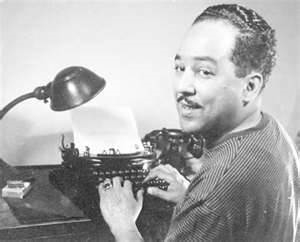 |
| (http://stompinatthasavoy.com/page/8/ ()) |
Hughes exhibited his attribute of courage throughout his entire writing career as well, unwilling to let the malignant comments of critics and his own seemingly hopeless prospects dispirit him. He demonstrated this quality of courage by not succumbing to the cruel anger that met him with most of his publications: "Most black critics did not like what they saw as the mean and dirty picture of black people in these poems. Their anger at Hughes was strong: a review in one black newspaper, the Pittsburgh Courier, was headlined as 'Hughes' Book of Poems Trash.' A critic for New York's Amsterdam News declared that the book could only have been written by a 'sewer dweller.' In the black Chicago Whip, Fine Clothes to the Jew earned Hughes' the disparaging title, the poet lowrate of Harlem'" (Wallace 95). Though critics lambasted him with hurtful reviews, Hughes displayed the courage to rise above them and continued doing what he did best: writing. He did not let the negative words of other critics paralyze his writing career. Undaunted by the ephemeral words of such spiteful critics, Hughes forged on ahead. Furthermore, Hughes was fearless in the face of an unpromising future, as he wrote of in his autobiography, The Big Sea: "Mostly I had received no income at all from my poetry (since I gratefully gave it away to anybody who would publish it) and very little from the new stories or articles I had written...So as yet the big editors did not know my name, or gave no sign of knowing it. And my play, Mulatto, was unproduced. Nevertheless, I'd finally and definitely made up my mind to continue being a writer and to become a professional writer, making my living from writing." (Langston 355). Hughes experienced a time in his life when the future seemed hopeless, yet he still decided to brave through the storm. His willingness to step forward into the shaky, uncertain future said much about his gutsiness. He decided he would live solely on his written words, without a second job to supplement his low income, which exemplified his courage and fearlessness. Langston Hughes proved his bravery through his daring and composure when life's more despairing moments sank upon him.
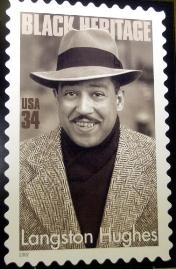 |
| (http://globalfusionproductions.com/fbl/wp-content/ ()) |
Langston Hughes also stored a fiery determination, a trait that blazed his way into his passion of writing. As a boy growing up, Hughes confronted several demoralizing moments in his pursuit of writing, but decided to do what he loved most anyways: "The idea disappointed Hughes. He did not want to become an engineer. His own dream, he told his father, was to become a writer. 'A writer?' James asked in disbelief, 'Do they make any money?' Writing might be a satisfying hobby, James meant to imply, but no writer he ever heard of--especially no black writer--had earned a living by it. His father's discouragement deeply dismayed Hughes, but it was not enough to bury his hopes of one day becoming a successful writer" (Wallace 23). Though his own father discouraged his hopes, Hughes was resolute to become a writer. Because of this single-mindedness, he emerged as one of America's greatest writers from the Harlem Renaissance. By finding his passion and sticking to it, no matter what people said or thought, Hughes embodied the determination present in all heroes. Hughes' tenacity stayed with him his entire life, revealing itself far into his literary career: "Then I'd had a scholarship, a few literary awards, a patron. But those things were ended now, I would have to make my own living again--so I determined to make it writing. I did. Shortly poetry became bread; prose, shelter and raiment. Words turned into songs, plays, scenarios, articles, and stories" (Langston 335). When hardship impeded Hughes' progress as a writer, Hughes unwaveringly leapt over the obstacles. Hughes restarted his vocation as an author, when most would've quit. His tide of monetary income had suddenly ended, but Hughes persistence to continue writing without the financial security showed his resolve. Hughes loved writing to such a degree that he staked his future on it. He was determined to write; not just for a living, but for life. Hughes began as a boy with dreams to become a writer, and he doggedly pursued that dream. His determination never left him as he followed his goal to become a writer, despite dejection and poverty.
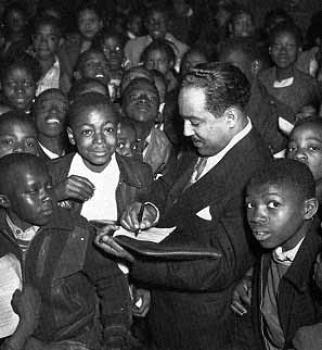 |
| (http://a.allpoetry.com/images/ext/Item/8495/525.jp ()) |
Langston Hughes is a hero for people today because of the hope he inspired in others, and the mettle and tenacity he displayed in his outstanding life. Hughes used his genius of writing to bring hope in the lives of his readers, inspiring them to lead happier lives. A true hero uses his talents to help others around him. Hughes did not let fear paralyze his writing career, just as a hero does not let fear factor into the pursuit of his goals. Finally, Hughes' tenacity brought him fruit after relentlessly working his way up in literature. Heroes are marked by their stick-to-itiveness when the going gets tough, and Langston Hughes kept going. Langston Hughes' life and works inspire me each and every day. He applied his passion of writing to inspire others with hope. His words are deceptively simple enough, but those words are eternal, ingrained in history now. Hughes is long gone, but his words and hopeful poems will always be around. His father laughed in his face when Hughes told him he wanted to be a writer, and if Hughes had listened, he would have never become one of the greatest writers of the 20th century. His words would not be here today, about 40 years after his death, to inspire, to advise, and to teach people like you and me. Hughes' life taught me to never give up, to never stop pursuing my dreams, and to never lose sight of my goals. Hughes demonstrated how to have a tough skin. He did not let ruthless words hinder his career. His courage inspires me to believe in myself and to overcome my insecurities whenever words are used as arrows. The most inspiring things from Langston Hughes are his messages of hope and dreams, however. "Mother to Son" inspires me to appreciate my own family's hardship and to never stop climbing up the stairs of life. "A Dream Deferred" inspires me to treasure my dreams and not give up on them. Langston Hughes' poems are so rousing in fact, that whenever my mother feels sad or hopeless, I simply read her one of Hughes' quotes. Langston Hughes motivates me through his indomitable life and uplifting, human poetry. That is why Langston Hughes is my hero. He can't fly. He can't teleport. He can't even see through walls. But Langston Hughes has one thing that all the superheroes can't match: his pen. With it, he inspired and encouraged more people writing words than lives superheroes could have ever saved. His words are forever, inspiring at least one more person each time someone reads them, hears them, or speaks them. Though he is dead, Hughes continues to be a source of comfort and hope. As Emily Dickinson once wrote, "If I can stop one heart from breaking, I shall not live in vain." Hughes has certainly not lived in vain. Langston Hughes may be forgotten, his life lost in the sands of time, but his words will remain behind, a tribute to humanity's perpetual hope.
Works Cited
"Langston Hughes." : The Poetry Foundation. Poetry Foundation, n.d. Web. 10 Dec. 2012.
"(James) Langston Hughes." DISCovering Authors. Detroit: Gale, 2003. Gale Student Resources
In Context. Web. 10 Dec. 2012.
"Langston Hughes." Contemporary Heroes and Heroines. Vol. 2. Gale, 1992. Gale Biography In
Context. Web. 10 Dec. 2012.
Hughes, Langston. The Big Sea. New York: Thunder's Mouth, 1988. Print.
Page created on 1/11/2013 12:00:00 AM
Last edited 1/11/2013 12:00:00 AM
